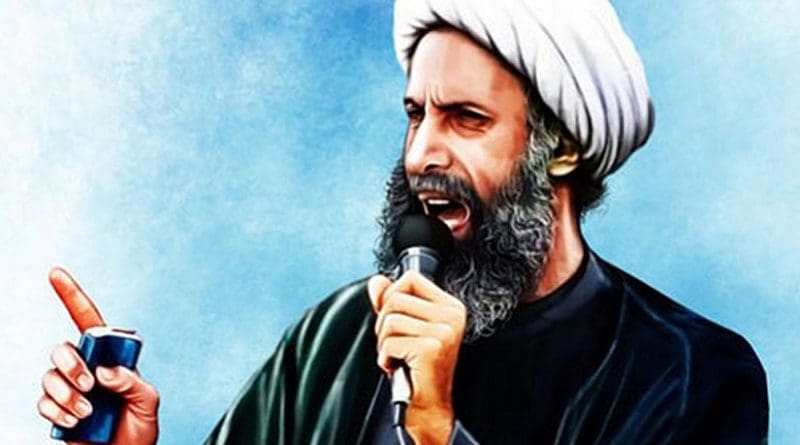What Prompted Saudi Arabia To Execute Sheikh Nimr? – OpEd
By Iran Review
By Alireza Miryousefi*
The execution of Saudi Arabia’s top Shia cleric, Sheikh Nimr al-Nimr, was carried out at a specific time and in a calculated manner by Saudi Arabia. The choice of this time was not haphazard. Some analysts believe that due to high number of executions in Saudi Arabia in 2015, the country’s officials chose early days of 2016 for the execution of Sheikh Nimr in order to prevent execution figures for 2015 to further increase. However, this is not the entire story. Sheikh Nimr was in custody since 2012 and his death sentence had been handed down since a long time ago. Clarification of why that sentence was carried out at this specific time can greatly help analysis of the reasons and considerations that are behind this measure by Saudi Arabia.
The execution of Sheikh Nimr was, in fact, an extension of domestic and regional challenges with which Saudi Arabia has been faced since 2011, and after the rise of the Islamic Awakening (Arab Spring). In early February 2011, after the beginning of Tunisian revolution and the start of unrest in Egypt, the most important question that worried the West and regional Arab countries alike was the possibility of the victory of a new Islamic revolution like the Iranian revolution in three countries of Egypt, Saudi Arabia, and later on, Jordan. They were greatly concerned about this issue and predicted that a revolution in Saudi Arabia would take place in the near future. At that time, American media published reports, which showed that despite the common picture that depicts Saudi people as a rich nation, this country is suffering from profound economic and social challenges. Therefore, some American and regional media and analysts introduced Saudi Arabia as the new destination of the domino-like wave of Arab uprisings. This was why the policy of iron fist and projection of domestic and regional problems was put on the agenda of Riyadh. On February 8, 2011, and three days before the downfall of the then Egyptian dictator, Hosni Mobarak, Saudi Arabia officially informed its allies of its iron fist policy and emphasized that even at the cost of the lives of thousands of people, it will counter the wave of the Arab awakening both inside and outside Saudi Arabia.
Saudi Arabia’s policy was based on suppressing domestic opposition and offering bloody support for its allies and also to take advantage of sectarian strife and military force to topple those governments that were opposed to Saudi Arabia’s policy in the region. Through a combination of these policies, and especially by deviating the course of Arab revolutions, including through waging war in Syria, and also by relying on its huge oil revenues and injecting about USD 103 billion of direct welfare aid to Saudi families and offering hefty financial and military support for its regional allies, Saudi Arabia managed to somehow control the situation. However, the fundaments of this policy faced serious challenges toward the end of 2015. One of those challenges was achievement of the Joint Comprehensive Plan of Action (JCPOA) by Iran, which boosted regional and international standing of Iran and reduced grounds for continuation of Iranophobia policy. On the other hand, sharp reduction in global oil prices also faced Saudi Arabia with major problems both inside and outside the country, which made the pursuit of Riyadh’s adventurous policies in Yemen and Syria more difficult. Finally, the four-sided coalition formed by Syria, Iran, Iraq and Russia changed the balance of power in Syria to the detriment of Saudi Arabia, undermining Riyadh’s standing in the Arab country.
During recent years, Saudi Arabia has made consistent efforts to fan the flames of sectarian differences between Shias and Sunnis and has tried to create a bipolar atmosphere against Iran by projecting its domestic and regional challenges. The recent execution of Sheikh Nimr was exactly done with the goal of further intensification of sectarian disputes. Through this measure, Saudi Arabia tried to find a way out of its current dire straits and unsuitable situation. In addition, domestic challenges have exacerbated in Saudi Arabia following the demise of King Abdullah after which “a bunch of inexperienced youths have taken charge of the country’s affairs and have caused the savage aspect [of the country’s policies] to overcome its outward prudence and pretence, and this situation will certainly work to their detriment.” In fact, the balance of power that traditionally existed among three major Saudi power poles, namely, the king, the princes and Wahhabi clerics, has been totally disrupted. Therefore, the execution of Sheikh Nimr does not simply pertain to Iran and is not a matter of Shia-Sunni as well, but it is related to the entire Islamic world and is a step against the general interests and the unity of the Muslim world.
* Alireza Miryousefi
Director for Middle East Studies,
Iranian Foreign Ministry’s Institute for Political and International Studies (IPIS)

